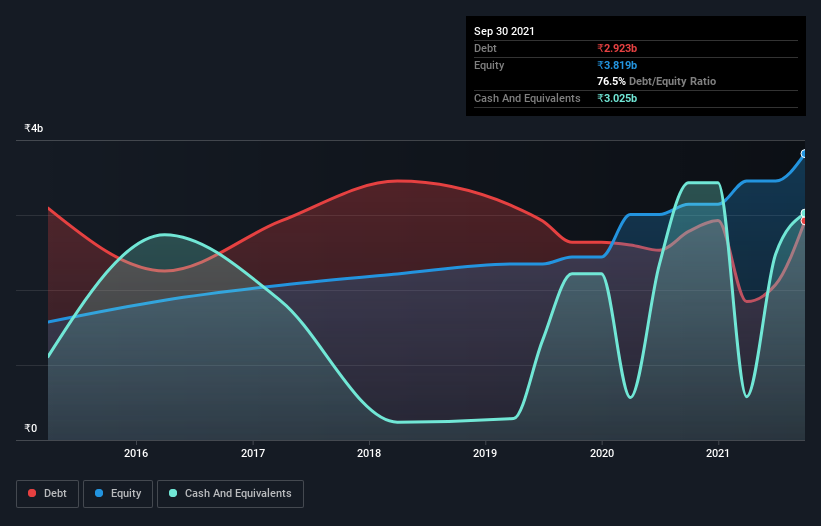Does Gokul Agro Resources (NSE:GOKULAGRO) Have A Healthy Balance Sheet?

The external fund manager backed by Berkshire Hathaway's Charlie Munger, Li Lu, makes no bones about it when he says 'The biggest investment risk is not the volatility of prices, but whether you will suffer a permanent loss of capital.' It's only natural to consider a company's balance sheet when you examine how risky it is, since debt is often involved when a business collapses. We can see that Gokul Agro Resources Limited (NSE:GOKULAGRO) does use debt in its business. But the real question is whether this debt is making the company risky.
When Is Debt Dangerous?
Debt assists a business until the business has trouble paying it off, either with new capital or with free cash flow. In the worst case scenario, a company can go bankrupt if it cannot pay its creditors. However, a more usual (but still expensive) situation is where a company must dilute shareholders at a cheap share price simply to get debt under control. Of course, plenty of companies use debt to fund growth, without any negative consequences. When we examine debt levels, we first consider both cash and debt levels, together.
Check out our latest analysis for Gokul Agro Resources
What Is Gokul Agro Resources's Net Debt?
You can click the graphic below for the historical numbers, but it shows that as of September 2021 Gokul Agro Resources had ₹2.92b of debt, an increase on ₹2.78b, over one year. However, it does have ₹3.02b in cash offsetting this, leading to net cash of ₹102.0m.

A Look At Gokul Agro Resources' Liabilities
Zooming in on the latest balance sheet data, we can see that Gokul Agro Resources had liabilities of ₹12.2b due within 12 months and liabilities of ₹944.0m due beyond that. On the other hand, it had cash of ₹3.02b and ₹3.31b worth of receivables due within a year. So its liabilities total ₹6.79b more than the combination of its cash and short-term receivables.
This is a mountain of leverage relative to its market capitalization of ₹8.75b. This suggests shareholders would be heavily diluted if the company needed to shore up its balance sheet in a hurry. Despite its noteworthy liabilities, Gokul Agro Resources boasts net cash, so it's fair to say it does not have a heavy debt load!
Another good sign is that Gokul Agro Resources has been able to increase its EBIT by 20% in twelve months, making it easier to pay down debt. There's no doubt that we learn most about debt from the balance sheet. But you can't view debt in total isolation; since Gokul Agro Resources will need earnings to service that debt. So when considering debt, it's definitely worth looking at the earnings trend. Click here for an interactive snapshot.
Finally, while the tax-man may adore accounting profits, lenders only accept cold hard cash. While Gokul Agro Resources has net cash on its balance sheet, it's still worth taking a look at its ability to convert earnings before interest and tax (EBIT) to free cash flow, to help us understand how quickly it is building (or eroding) that cash balance. In the last three years, Gokul Agro Resources's free cash flow amounted to 47% of its EBIT, less than we'd expect. That's not great, when it comes to paying down debt.
Summing up
Although Gokul Agro Resources's balance sheet isn't particularly strong, due to the total liabilities, it is clearly positive to see that it has net cash of ₹102.0m. And it impressed us with its EBIT growth of 20% over the last year. So we don't have any problem with Gokul Agro Resources's use of debt. When analysing debt levels, the balance sheet is the obvious place to start. But ultimately, every company can contain risks that exist outside of the balance sheet. Be aware that Gokul Agro Resources is showing 3 warning signs in our investment analysis , and 1 of those makes us a bit uncomfortable...
If you're interested in investing in businesses that can grow profits without the burden of debt, then check out this free list of growing businesses that have net cash on the balance sheet.
New: Manage All Your Stock Portfolios in One Place
We've created the ultimate portfolio companion for stock investors, and it's free.
• Connect an unlimited number of Portfolios and see your total in one currency
• Be alerted to new Warning Signs or Risks via email or mobile
• Track the Fair Value of your stocks
Have feedback on this article? Concerned about the content? Get in touch with us directly. Alternatively, email editorial-team (at) simplywallst.com.
This article by Simply Wall St is general in nature. We provide commentary based on historical data and analyst forecasts only using an unbiased methodology and our articles are not intended to be financial advice. It does not constitute a recommendation to buy or sell any stock, and does not take account of your objectives, or your financial situation. We aim to bring you long-term focused analysis driven by fundamental data. Note that our analysis may not factor in the latest price-sensitive company announcements or qualitative material. Simply Wall St has no position in any stocks mentioned.
About NSEI:GOKULAGRO
Gokul Agro Resources
Engages in the manufacture and trading of edible and non-edible oils, meals, and other agro products in India.
Outstanding track record with flawless balance sheet.
Similar Companies
Market Insights
Community Narratives



